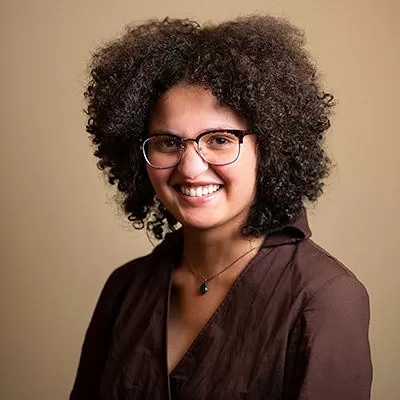Sex and Psychology is expanding! We’re pleased to introduce the latest additions to the team this week and next, who will help continue our mission of bringing you science-based sex ed. First up:
Merissa Prine (she/her) is a PhD student at the University of Guelph in the Family Relations and Human Development program. Her sexual health research focuses on sexual authenticity, communication, and consent – and she hopes to continue exploring research on factors that help or hinder sexual desire in long-term relationships. Merissa is currently based in Toronto, Ontario where she enjoys spending time with her dogs, hiking, and trying new recipes.
I asked Merissa some questions about herself and her work. Read below for our conversation.
Q: How did you become interested in sex research? Did you have a specific pivotal moment?
A: I originally started my academic career at Western University in nursing, where I enrolled in an introductory human sexuality class as an elective. After the first lecture with Dr. William Fisher, I quickly realized that I had a burning desire to become a sex researcher. I decided to pursue a degree in psychology with a specific focus on human sexual behaviour. It was honestly a scary jump from nursing to sex research. I’m sure there was judgement when I shared the news with everyone, but it is still one of the best decisions I’ve ever made.
Q: Do you have a favorite topic you have researched so far in your career?
A: Hmmm… it is hard to choose just one! I feel really passionate about a lot of different areas of sex research. If I had to choose an overarching theme to my research interests, I would say that I tend to be interested in researching areas that lean into promoting sexual self-efficacy. That’s why sexual communication and sexual authenticity stand out for me. I think being able to communicate your innermost wants, desires, and fantasies can be liberating, satisfying, and can help create deep connections with sexual partners.
Q: Since much of your research has been about communication and relationships, how do you see yourself sharing your research findings in the future?
A: This is something that I have been giving a lot of thought to recently, and it’s one of the reasons why I feel so positively about Sex and Psychology. Much of existing research is behind closed doors where the vast majority of people will never see it, whereas other channels (e.g., social media, podcasts, books, etc.) are much more accessible to the public. Personally, I haven’t found my niche yet for the best place to share my findings outside of traditional conferences and research publications, but I can see this changing quite a bit in the next few years of my career!
Q: What made you want to get involved with Sex and Psychology?
A: Honestly, it seemed like the perfect opportunity to be involved in something bigger than myself and a chance to use my knowledge in a way that would positively impact the community. I really believe in Sex and Psychology’s mission to spread evidence-based information about sex and sexuality. I have been a follower of Dr. Lehmiller’s work for quite a few years, so when I saw the opportunity arise, I felt compelled to join the team!
Q: What’s one sex myth you think everyone needs to know the truth about?
A: The first that comes to mind is “I would be able to tell if my partner had an STI,” or that having a urine test will test for the full range of STIs. I didn’t confront these myths until learning more about STIs in a university-level sexuality class. I think these myths are particularly troubling because people are just trying to make the best choices for their sexual health, but they’re missing key information about how to keep themselves and their partners safe.
Curious to learn more about STI myths? Check out our previous post, “5 Common Myths About Sexually Transmitted Infections.”
Q: Do you have a recent favorite sex- or relationship-related book or media?
A: I recently watched “The Principles of Pleasure” series on Netflix, and I really enjoyed it! I think they did an excellent job of dispelling some popular myths and celebrated different forms of pleasure in an interesting and easily digestible way.
Q: What’s something people might be surprised to know about you?
A: I actually really enjoy learning statistics. I know most people are not fans of math, but I find working with data to be very satisfying!
Q: Where can people find you?
A: You’re welcome to check out my LinkedIn.
Q: Is there anything else you want people to know?
A: Yes, I am a huge dog lover and avid hiker. During my time off you are likely to find me on a trail with my two dogs, Poppy and Maple. I also really enjoy cooking and I am always on the lookout for new vegetarian recipes!


Merissa’s dogs Poppy and Maple
Welcome to Sex and Psychology, Merissa!
Image Credits: Photos provided by Merissa Prine


 Anal Beads
Anal Beads Anal Vibrators
Anal Vibrators Butt Plugs
Butt Plugs Prostate Massagers
Prostate Massagers
 Alien Dildos
Alien Dildos Realistic Dildos
Realistic Dildos
 Kegel Exercisers & Balls
Kegel Exercisers & Balls Classic Vibrating Eggs
Classic Vibrating Eggs Remote Vibrating Eggs
Remote Vibrating Eggs Vibrating Bullets
Vibrating Bullets
 Bullet Vibrators
Bullet Vibrators Classic Vibrators
Classic Vibrators Clitoral Vibrators
Clitoral Vibrators G-Spot Vibrators
G-Spot Vibrators Massage Wand Vibrators
Massage Wand Vibrators Rabbit Vibrators
Rabbit Vibrators Remote Vibrators
Remote Vibrators
 Pocket Stroker & Pussy Masturbators
Pocket Stroker & Pussy Masturbators Vibrating Masturbators
Vibrating Masturbators
 Cock Rings
Cock Rings Penis Pumps
Penis Pumps
 Wearable Vibrators
Wearable Vibrators Blindfolds, Masks & Gags
Blindfolds, Masks & Gags Bondage Kits
Bondage Kits Bondage Wear & Fetish Clothing
Bondage Wear & Fetish Clothing Restraints & Handcuffs
Restraints & Handcuffs Sex Swings
Sex Swings Ticklers, Paddles & Whips
Ticklers, Paddles & Whips















